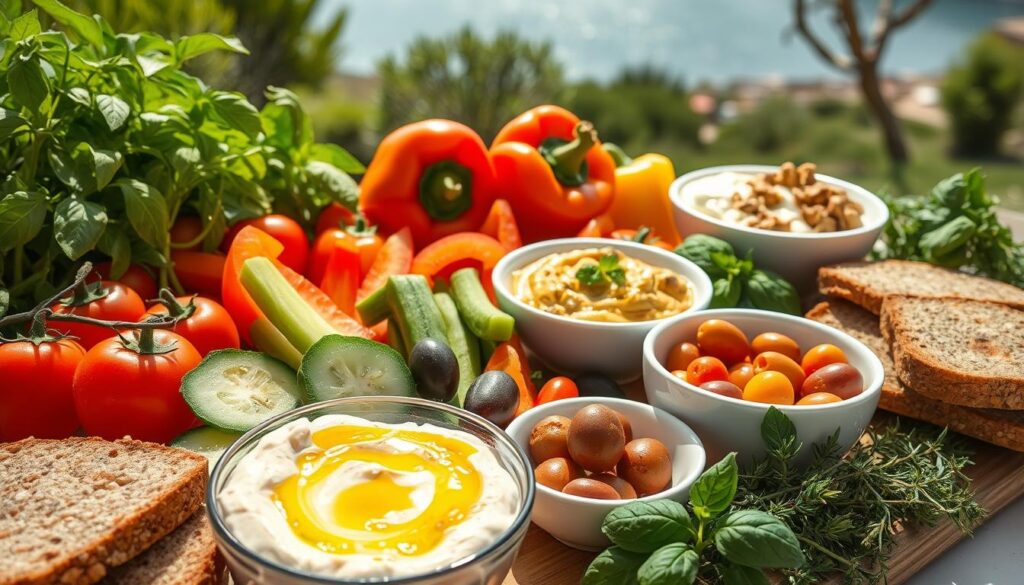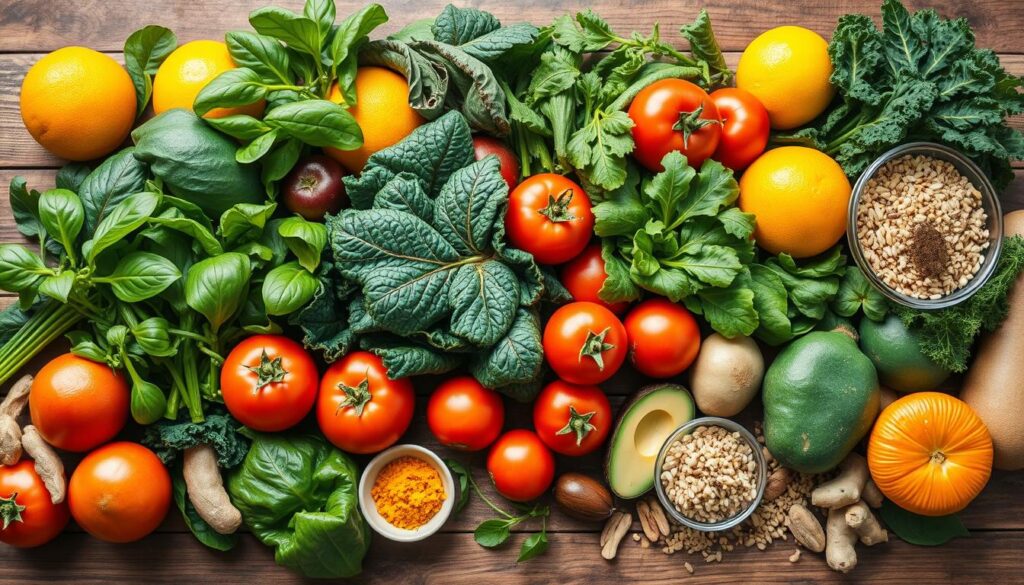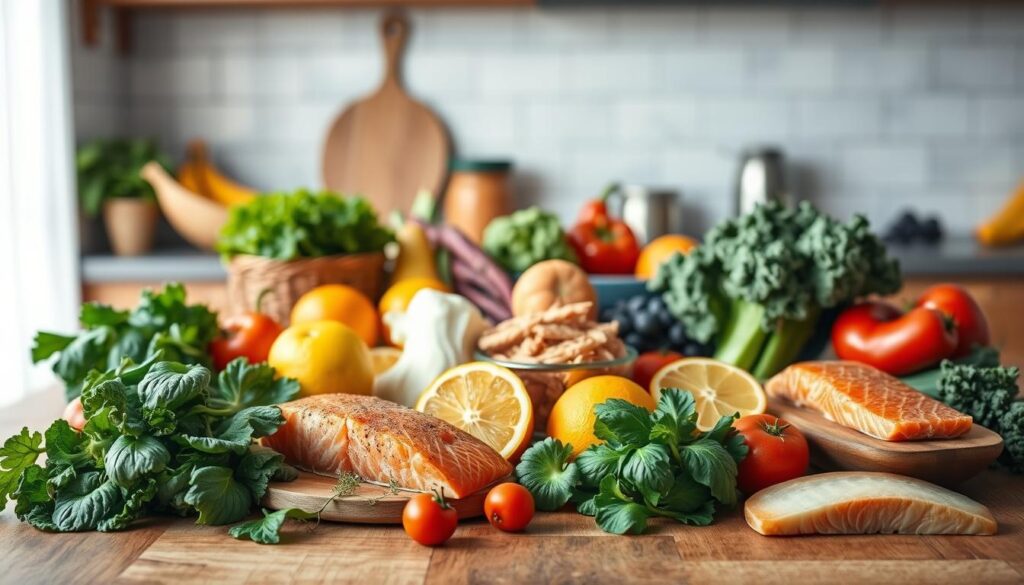Fatty liver disease happens when too much fat builds up in the liver. There are two main types: Nonalcoholic Fatty Liver Disease (NAFLD) and Alcohol-Related Fatty Liver Disease (ARLD). NAFLD is more common in people who are overweight or have type 2 diabetes.
The first step for overweight people with NAFLD is to lose weight slowly. This can be done by eating fewer calories, exercising, and eating healthy. A good diet for NAFLD includes foods high in fiber, protein, and good fats.
Key Takeaways
- Fatty liver disease is a common condition caused by excess fat buildup in the liver.
- NAFLD is the more prevalent type, associated with obesity and type 2 diabetes.
- A healthy diet for fatty liver disease focuses on whole, unprocessed foods.
- Limiting alcohol, added sugar, refined carbs, and saturated fats is crucial.
- Incorporating liver-friendly foods like fruits, vegetables, and omega-3 rich fish can help manage fatty liver disease.
Understanding Fatty Liver Disease: Types and Causes
Fatty liver disease, also known as hepatic steatosis, is a common liver issue. There are two main types: Nonalcoholic Fatty Liver Disease (NAFLD) and Alcohol-Related Fatty Liver Disease (ARLD). Knowing the difference is key for liver disease prevention and managing liver disease.
Nonalcoholic Fatty Liver Disease (NAFLD)
NAFLD is a common liver problem in the U.S. It affects about 25% of people worldwide and 24% of adults in the U.S. It’s when fat builds up in the liver without drinking a lot of alcohol. This can turn into a worse form called Nonalcoholic Steatohepatitis (NASH). NASH can cause inflammation, cirrhosis, and liver failure if not treated.
Alcohol-Related Fatty Liver Disease (ARLD)
ARLD is caused by drinking too much alcohol. It affects about 5% of people in the U.S. It’s more common in people who drink a lot, especially women, the obese, and those with certain genes.
Risk Factors and Development
Fatty liver disease often comes from lifestyle choices like being overweight, having type 2 diabetes, high blood lipids, and metabolic syndrome. These can lead to fat in the liver, causing inflammation and damage. Genetics and some medical conditions also raise the risk.
Early symptoms of NAFLD and ARLD are often not there or are mild. So, it’s important to know the risk factors and get medical help for early diagnosis and managing liver disease.
“Lifestyle changes such as a healthy diet, regular exercise, and avoiding alcohol intake are recommended for managing fatty liver disease.“
How Diet Impacts Your Liver Health
Your diet is very important for your liver health. Eating foods rich in fiber, lean or plant-based protein, and healthy fats helps. These foods improve liver function and lower disease risk.
The liver removes toxins and makes bile. Bile breaks down fat for digestion. Foods high in omega-3 fatty acids, antioxidants, and complex carbs help repair a fatty liver. It’s also key to avoid processed foods, added sugars, and too much alcohol.
To help your liver, add these foods to your diet:
- Omega-3 fatty acids found in fish, fish oil, walnuts, and flaxseeds
- Antioxidant-rich foods like berries, green tea, raw garlic, and leafy greens
- Complex carbohydrates from whole grains, legumes, and starchy vegetables
- Monounsaturated fats from plant sources like olives, avocados, and nuts
Also, cut down on saturated fats, added sugars, and alcohol. A Mediterranean diet is good for your heart and liver. It focuses on plant-based foods and healthy fats.
| Nutrient | Liver-Supportive Benefits | Food Sources |
|---|---|---|
| Omega-3 Fatty Acids | Reduce inflammation and triglyceride levels | Fish, fish oil, walnuts, flaxseeds |
| Antioxidants | Protect liver cells from damage | Berries, green tea, raw garlic, leafy greens |
| Vitamin E | Supports liver health and function | Sunflower seeds, almonds, plant-based oils |
| Fiber | Promotes healthy digestion and weight management | Whole grains, fruits, vegetables, legumes |
It’s important to make your diet fit your needs. Talking to a registered dietitian can help. They can create a diet plan that’s right for you.
Foods to Avoid on Fatty Liver
If you have fatty liver disease, watch what you eat. Some foods can make it worse. Others can help your liver. Let’s look at foods to avoid for a healthy liver.
Alcohol and Sugary Beverages
Too much alcohol harms your liver. Try to drink less or none at all. Sugary drinks like soda and sweet coffee also hurt your liver. [https://6401e9jwxbhz-l3o58lh19v54l.hop.clickbank.net] Drink water, unsweetened tea, or low-fat dairy instead.
Processed and Refined Foods
White bread and pasta can raise your blood sugar. This makes fatty liver worse. Eat whole-grain foods for better liver health.
High Saturated Fat Foods
Foods like fatty meats and fried foods are bad for your liver. [https://6401e9jwxbhz-l3o58lh19v54l.hop.clickbank.net] Choose nuts, seeds, and avocados for better fats.
Managing fatty liver disease means avoiding bad foods and eating well. A healthy diet and active life help your liver. These changes support your liver and overall health.
“The enemy of the liver are sugars and carbohydrates,” advises Dr. Delgado-Borrego, recommending patients avoid juice, soda, and refined carbohydrates.
The Mediterranean Diet Connection
For those with fatty liver disease, the Mediterranean diet is a good choice. It’s full of whole foods and can help your liver a lot.
This diet uses healthy fats like olive oil, nuts, and fish. These fats can lower bad cholesterol and make your liver work better. Eating this way can lower your risk of getting a common liver disease.
The diet also has lots of fiber from grains, beans, fruits, and veggies. This helps you feel full and can help you lose weight. Losing weight is key to fighting fatty liver disease.
It also has antioxidants and anti-inflammatory stuff. These help reduce stress and inflammation in your liver. Both are bad for fatty liver disease.
“The Mediterranean diet improves how your body handles sugar. This is key for fighting fatty liver disease. It helps keep fat out of your liver.”
But, remember, this diet is just part of the solution. You also need to exercise regularly. Talk to your doctor to make a plan that’s right for you.

Adding the Mediterranean diet to your life can help your liver. It’s full of foods that are good for your liver. Enjoy the benefits it brings.
Essential Nutrients for Liver Health
Your liver is very important. Keeping it healthy is key, especially if you have fatty liver. Some nutrients are great for your liver. Let’s look at omega-3 fatty acids, antioxidants, vitamins, minerals, and more.
Omega-3 Fatty Acids
Omega-3 fatty acids are in fish like salmon and in foods like flaxseeds. They help reduce liver fat and inflammation. These fats can lower the risk of fatty liver disease.
Antioxidants and Vitamins
Antioxidants like vitamin E are in fruits and green tea. They protect liver cells. Vitamin D also helps with fatty liver disease. Eating enough of these can help your liver.
Minerals and Compounds
Potassium is in fruits and vegetables. It’s good for people with fatty liver. Betaine in wheat germ and shrimp also helps the liver. Garlic can help with weight and fat in fatty liver disease.
Eating these nutrients can help your liver. Talk to your doctor about a diet plan for you.
Power Foods That Support Liver Function
Some foods help your liver stay healthy. Adding these liver-friendly foods to your meals can make your liver better. This is good for your overall health too.
Coffee is great for your liver. Drinking 3-4 cups a day might protect it. Green tea, full of antioxidants, can also help your liver. It makes liver enzymes lower and helps with fatty liver symptoms.
Vegetables like broccoli help the liver break down fats. Walnuts, with omega-3 fatty acids, lower the risk of fatty liver. Soy and whey protein also help reduce liver fat.
Other good foods for your liver are leafy greens, beans, and whole grains. Eating these foods helps your liver work better and keeps you healthy.

Eating well is important for a healthy liver. Choosing the right foods helps your liver stay strong. This lowers the chance of getting fatty liver disease.
Daily Meal Planning for Fatty Liver
Eating well is key when you have fatty liver disease. It doesn’t matter if it’s from too much sugar or drinking too much alcohol. A good meal plan can really help your liver. Let’s look at some tasty and healthy foods to add to your day.
Breakfast Options
Begin your day with these healthy breakfasts:
- Oatmeal with almond butter, chia seeds, and berries
- Scrambled eggs, spinach, and whole-grain toast
- Greek yogurt, sliced apples, and cinnamon
Lunch and Dinner Ideas
For lunch and dinner, choose foods that are good for your liver:
- Spinach salad, grilled chicken, and a small potato
- Grilled salmon, quinoa, and steamed veggies
- Stir-fried tofu, bell peppers, and brown rice
Healthy Snacks
Snacks can help keep your liver healthy all day. Try these:
- Apple slices with peanut butter
- Raw carrots and bell peppers with hummus
- Unsalted nuts like almonds or walnuts
When you’re on a fatty liver diet, watch your portion sizes and calories. For weight loss, aim for 1,200-1,500 calories a day. For ARLD, eat about 2,000 calories to avoid not getting enough nutrients.
Adding liver-friendly foods and planning your meals well can help manage fatty liver. Remember, being consistent and eating in moderation are important for a good fatty liver diet.
Exercise and Lifestyle Modifications
Keeping a healthy lifestyle is key when dealing with fatty liver disease. Regular exercise is very important for your liver. The American Gastroenterological Association says you should do 150-300 minutes of moderate exercise a week. Or, do 75-150 minutes of vigorous exercise.
Adding strength training can also help. This can make your condition better.
Aerobic exercises like brisk walking or swimming can help. They reduce liver fat and lower inflammation. Stress management, enough sleep, and not smoking also help your liver.
By making these changes, you can help manage your liver disease. And you can stop it from getting worse.
Remember, exercise, a good diet, and lifestyle changes are very helpful. They support your liver health and lower the risk of more problems. Talk to your doctor to make a plan that fits you. This will help you manage your liver disease well.


A Life-Changing Experience with This Weight Loss Supplement (Nagano Tonic)
I’ve always struggled with finding a weight loss solution that actually works for me. Like many, I’ve tried numerous diets, exercise routines, and supplements over the years—some worked for a short time, but nothing ever gave me long-term results. That was until I decided to try the weight loss supplement I found : Link to the Supplement.
From the moment I started using it, I noticed a difference. Not only did I feel more energized, but my cravings also became more manageable. The best part? I started seeing results much quicker than I anticipated! Over the course of just a few weeks, I noticed a significant reduction in belly fat and overall weight loss that I hadn’t been able to achieve before.
What makes this supplement stand out from all the others I’ve tried is how it supports me in my daily routine without any jitters or energy crashes. I’m able to stay focused and motivated, which has made it easier to stay on track with my diet and exercise plan.
This product truly exceeded my expectations, and I feel more confident and healthier than ever before. If you’re struggling with your weight loss journey like I was, I highly recommend giving this supplement a try. It’s been a game-changer for me, and I’m sure it can work wonders for you too!
Contant Them on email .. tonicnagano50@gmail.com
I’ve tried so many weight loss products over the years, but nothing worked like this supplement! Since I started using it, I’ve noticed a big difference in my energy levels and appetite control. In just a few weeks, I’ve lost weight and feel so much better. It’s been easy to stick with, and the results speak for themselves. Highly recommend this to anyone looking to make a real change!
wasn’t sure what to expect, but this weight loss supplement has really impressed me! After just a few weeks of use, I’ve already dropped a few pounds and feel more motivated to stay active. It’s helped curb my cravings and boosted my energy throughout the day. I’m excited to keep going and see even better results. Definitely worth trying!
Reach them on tonicnagano50@gmail.com
I was skeptical at first, but this supplement has truly made a difference in my weight loss journey. I’ve lost weight without feeling deprived or sluggish. My cravings are under control, and I feel more confident in my body. It’s easy to incorporate into my daily routine, and the results speak for themselves. I’m so glad I gave it a try!
Thanks David, i do use the link to make my purchase. you can get too here http://surl.li/iasppy
I’ve tried so many weight loss products, but this one has been by far the most effective. In just a few weeks, I’ve noticed a visible difference in my body and energy levels. It’s helped me stay on track without the constant hunger pangs and cravings. I’m really happy with my progress and can’t wait to see where I’ll be in another month!
This Nagano Tonic has been amazing! In just a few weeks, I’ve lost weight, feel more energized, and my cravings are under control. Highly recommend it!
Thats the link to purchase http://surl.li/iasppy